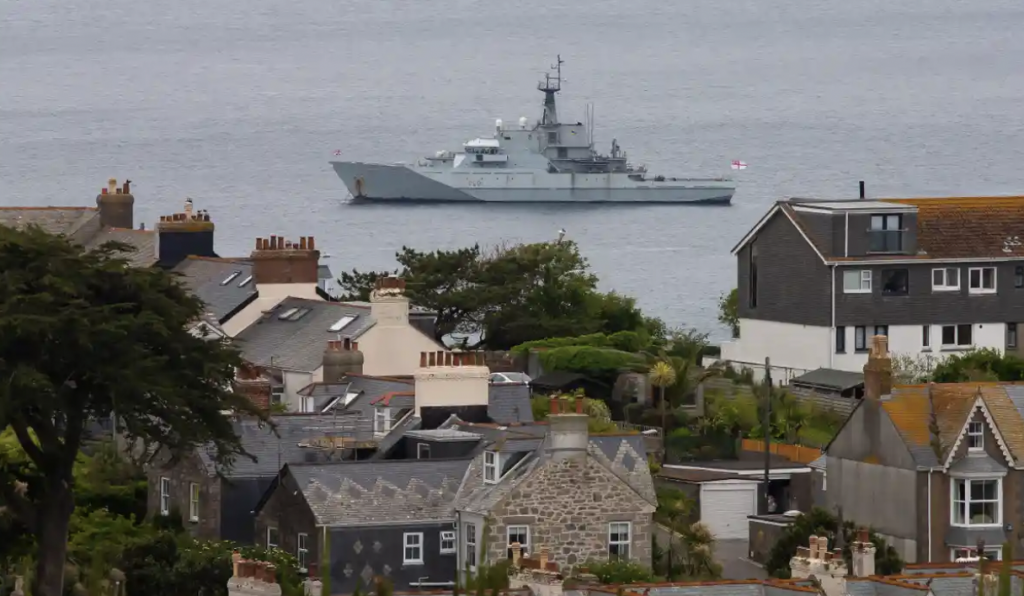From rule of six to 6,500 police: Cornwall hosts first Covid-era G7

Everybody from the most junior official to the president of the United States will have to follow the rules. Take daily Covid tests, wear masks at appropriate times and respect everything from one-way systems around venues to limits on how many people can gather around a table for a meal or drink.
Welcome to G7 UK 2021, the first world summit in the times of Covid.
It will be extraordinary in many ways. The setting, for a start. The Cornish seaside village of Carbis Bay and the towns of St Ives and Falmouth are the main focus, but expect beaches and tourist attractions to be used as backdrops.
Security is paramount. Warships are anchored off the coast and UK and US military aircraft are circling above. Police and secret service personnel are rubbing shoulders with holidaymakers.
Thousands of protesters will make their voices heard with demonstrations planned on beaches, at sea and in the streets. Residents are bracing themselves for noise, disturbance and traffic chaos.
The twists of the pandemic made the UK and other G7 members wary about pressing ahead with the face-to-face summit, but it is seen as part of a wider opening-up of diplomacy to in-person meetings.
Saudi Arabia was deeply disappointed when its G20 summit last year took place online, and G7 has always been regarded as a “fireside chat”, which would lose its impact and worth if done remotely.
There have been concessions. There was a plan for a Buckingham Palace banquet but the Queen opposed this, not thinking a lavish dinner was appropriate and fearing it could have been a potential super-spreader event. Joe Biden is settling for tea with her.
Still, a growing concern among Cornish people is that the summit could lead to an outbreak of Covid in an area with one of the lowest rates in the UK.
The deputy leader of the Liberal Democrats in Tory-controlled Cornwall, Colin Martin, said it was misleading to suggest all foreign visitors would be in a secure bubble. “Cornwall is one of the safest places but all this could be put at risk by crowds of politicians and journalists landing at Newquay airport and travelling around,” he said.
Cornwall’s director of public health, Rachel Wigglesworth, accepted that holding such an event during a pandemic came with “clear public health challenges”. She said all attenders needed to provide a negative Covid result before they arrived and then do daily lateral flow tests.
Cornwall council was firm: “There will be no blind eyes turned when it comes to following the basic rules.”
All this may make things like dining arrangements tricky. How will the seven G7 leaders be able to eat together when in England no more than six people are allowed to meet indoors at a pub or restaurant?
The Cabinet Office said: “All attendees and delegations will be required to follow UK public health regulations throughout the meeting. We will require them to respect strict Covid-secure measures.”
Asked if this meant leaders could only dine as a group of up to six, the Cabinet Office said only: “Leaders will also follow public health guidance.”
Meanwhile, the security operation is in full flow. About 6,500 police officersfrom across the UK are on duty, one-fifth of them housed on a cruise ship anchored off Falmouth.
There are 1,000 police vehicles on the streets of Cornwall, 150 dogs standing by and 18 police drones. Officers are armed with guns, baton rounds, stun guns, smoke and stun grenades and incapacitant spray.
The Royal Navy ships HMS Tyne and HMS Tamar are among the vessels that lie off the Cornish coast.
But most of the security is not obvious. For every visible naval ship or armed police officer, you can be sure there are many more special forces operatives. For every local police chief put up as a talking head, there are many dozens of security services specialists in London, GCHQ and Washington.
Perhaps optimistically, four “official” protest sites have been set up, two in Cornwall (Truro and Falmouth) and two in Devon (Plymouth and Exeter). But in the main, protesters will shun them and try to get as close to the leaders and media as possible.
The demonstrations will be many and varied. On Friday, young people from the Cornwall Youth Climate Alliance are organising a strike for schoolchildren on Gyllyngvase beach in Falmouth.
Extinction Rebellion (XR) is planning protest through art, music and dance on beaches, at sea and in St Ives and Falmouth. About 500 people have arrived at its campsite in St Ives.
A group called Resist G7, which includes the likes of the Anarchist Federation, Penzance Socialists and the Stop the War Coalition, is holding three days of protest including a “kill the bill” march on Sunday. Like XR, it is asking people to take a Covid test before travelling, and passing on the public health advice that everyone connected to G7 should take daily tests.
Some residents ask if it is worth it. The government has announced what it calls a “G7 legacy”, including town deals worth more than £65m for St Ives, Penzance and Camborne (though political opponents argue this is not really new as it was known the money was in the pipeline).
The Rev Chris Wallis, the coordinator of the St Ives food bank, said he feared that the attention the G7 summit would bring would disadvantage less well-off locals. “It will make house prices worse in this area. It will certainly make poverty worse for those that are trying to live here.”
Michael Davies, a shop worker who lives in Carbis Bay, said he worried about the disruption. “But I think overall there’s a mixture of excitement and apprehension. We don’t know what to expect. We’ve never had anything this big happen before.”
Source: (The Guardian)

